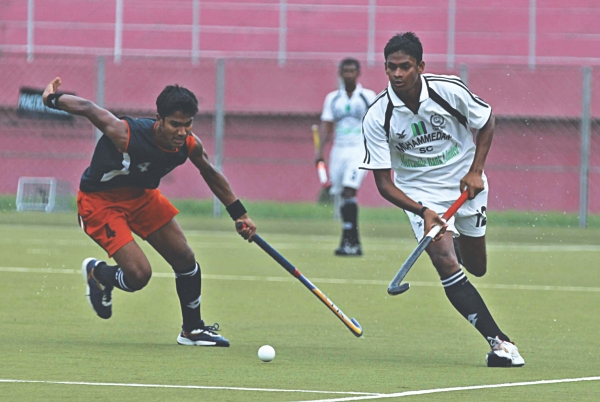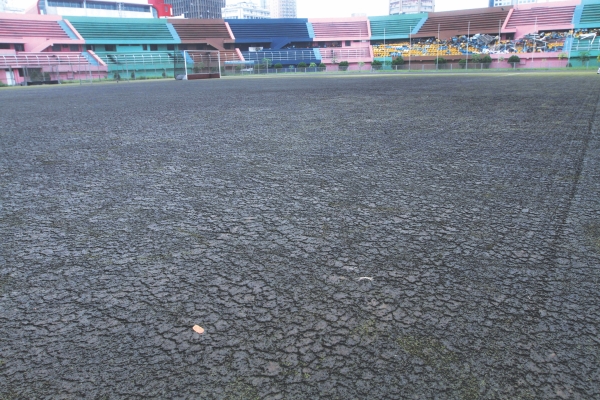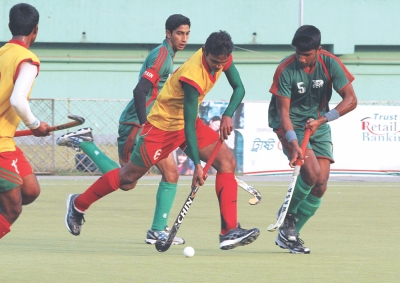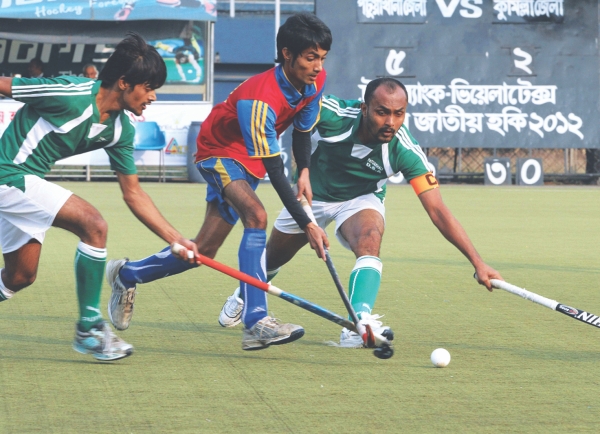| Home - Back Issues - The Team - Contact Us |
 |
| Volume 11 |Issue 18 | May 04, 2012 | |
|
|
Sport
Hockey: A Sport in Turmoil Bangladesh's recent victory in Bangkok, at the Asian Hockey Federation Cup has generated discussions of how hockey once had the potential of being the next 'cricket' in Bangladesh. the Star analyses the turmoil that the game is trying to overcome. Naimul Karim It's difficult to comprehend how games like hockey and football, have failed to develop as much as cricket in this country. While both these sports have had earlier beginnings and have a lot to offer in terms of entertainment, a sporting career in any other field apart from cricket, in Bangladesh, seems to be an unviable option these days. Our national hockey team recently won the Asian Hockey Federation (AHF) Cup held in Bangkok, and earned the right to participate in the Asia Cup, to be held in 2013. Considering that all the teams participating in the competition were ranked lower to Bangladesh and the fact that we had won the previous edition of this tournament in 2008, one expected the hockey team to breeze through this tournament and join the big league.
However, according to coach, Mahbub Harun, the tournament wasn't just a walk in the park. "Teams like Singapore, Chinese Taipei and Oman have improved a lot in last couple of years. Judging by the kind of infrastructure our federation provides us with, it was an achievement to have won the tournament. But if we don't improve, we'll definitely lose to these teams in the near future," exclaims Harun. Skipper Rasel Mahmud shares Harun's views. "The other teams in the tournament were prepared. Oman was in India for 20 days, Singapore played Olympic qualifiers; we didn't have any official practice match before the tournament. It's clear that the federations in these countries have a well-planned training schedule," says Mahmud. The fact that the Hockey Federation failed to organise the Premier Division League in 2011 and that there have been no First Division tournaments held in the last three years, displays the incompletance of the organisation. "We don't even have a proper 'second-team' to back the national side. It's difficult to replace players in the national team," explains Harun. Going deep into the problem, Harun claims that the lack of leagues at home has affected their progress. "How do you expect us to improve if there are’nt any leagues at home? The national side has only 12 players, but there are more than 200 players involved in leagues. That is bound to help us. If leagues are delayed or cancelled, players won't get practice."
This time, however, the Hockey Federation dispelled fears of another 'league-less' year by managing to rope in sponsors. They plan to begin the Premier Division League sometime in May. While a deal with Green Delta might have ensured leagues for the next three years, sponsorship in general has been a problem for the game. The most recent debacle came about when the Federation failed to send their U-21 side to Malaysia for a qualifying tournament. "There is definitely a shortage of sponsors. Without any finance we'll continue missing opportunities abroad and this will affect us negatively. We need lucrative deals where we can be sponsored for five years at the least," says Mahmud. The lack of leagues and sponsors have adversely affected the domestic structure of the game. It also compels players to look for alternative ways to ensure their bread and butter. As a result of which, a number of players are forced to sign short contracts with second-division teams abroad. While playing abroad might provide valuable experience, it also however, exposes the brittle domestic structure of the game in our country. "It's good when players go outside to play. But if our own domestic structure was strong enough, it would have helped us improve in a much better way," says Mahbub. One can perhaps take a cue from India and Pakistan, two of the higher ranked teams in the game. Innovations in their domestic structures have created world-class players from the sub-continent, which allows them to regularly compete at the top level. "India's domestic structure witnesses tournaments almost every other month. The tournaments there involve international players and are really competitive," explains Mahmud. "They also get to work in the companies they represent, so there isn't much of a financial problem for them," he adds. Echoing the captain's views, Mahbub believes that the national team can develop by a large degree if they adapt similar strategies. "Players in India and Pakistan have a monthly salary. Over here players get paid only when there are leagues. They have to depend on other sources of income," he says.
The lack of competitive teams in the Premier Division League is another cause for worry. Star-studded clubs like Mohammedan and Abahani dominated the league in 2010, keeping almost a 100 per cent track record. Players claim that better pay and financial support encourage them to join certain clubs. "If we had at least six competitive teams out of the ten, our league would have done a lot better. More the competition, better the game," explains the national coach. The national team's victory at Bangkok has come at a crucial time. Till last week, the Federation was criticised for its ineptitude. Although expected, the victory is bound to provide a sigh of relief for an otherwise struggling sport. Certain other positive events have also taken place in the last few weeks. Last month, the BHF and private satellite channel ATN Bangla singed an agreement in a bid to find out budding hockey players through holding competitions at grass-root levels. They also roped in actor Riazuddin Ahmed Siddiqui, as ambassador, with an aim to poplarise the game. Currently, the International Hockey Federation ranks Bangladesh in the 40th position. Going by the huge of difference in terms of caliber, amongst the minnows and the 'big boys', we are way behind. And unless we want to be just another 'cricket-crazy' nation from the sub-continent, concerned officials need to take steps in order to develop the game. One hopes that the recent victory, despite the lack of practice, makes people realise the huge potential that the game has.
Copyright
(R) thedailystar.net 2012 |
||||



